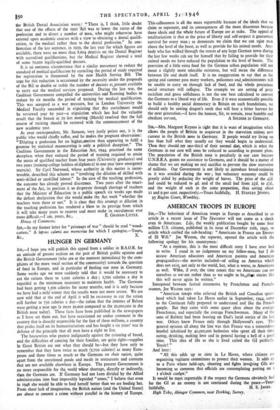AMERICAN TROOPS IN EUROPE
SIR,—The behaviour of American troops in Europe as described in an article in a recent issue of The Spectator will not come as a shock even to Americans. Life, the weekly publication bought by some four million U.S. citizens, published in its issue of December loth, 1945, an article which carried the sub-heading: "Americans in France are Envoys of Ill Will." Joe Weston, the reporter, opened the article with the following apology for his countrymen: "As a reporter, this is the most difficult story I have ever had to write. I stand in no judgement on my fellow-men, but I do accuse American educators and American parents and American propagandists—the movies included—of selling an America which does not exist, not only to the world, but, what is worse, to Americans as well. Wden, if ever, the time comes that we Americans can see ourselves as we-are rather than as we ought to beathan stories like this will never again be written."
Interposed between factual statements by Frenchmen and French- women, Joe Weston says:
"American troops who relieved the British and Canadian spear- head which had taken Le Havre earlier in September, 1944, came to the Continent fully prepared to understand and like the French people. But they came with some queer ideas about the average Frenchman, and especially the average Frenchwoman. Many of the sons of Babbitt had been feasting on Dad's lurid stories of the last war. Others knew France only through Hollywood's eyes. The general opinion all along the line was that France was a tremendous brothel inhabited by 40,000,000 hedonists who spent all their time eating, drinking, making love and in general having a hell of a good time. This idea of life as she is lived suited the GI perfectly. Yessir! "
And later:
" All this adds up to riots in Le Havre, where citizens are organising vigilante committees to protect their women. It adds up to a Paris where hold-ups, shooting and fights involving GIs are becoming so common that officials are contemplating putting on a I o'clock curfew."
It would be most regrettable if the respect the Germans obviously had for the GI as an enemy is not continued during the peace.—Yours faithfully, High Toby, Abinger Common, near Dorking, Surrey.
H. S. JANES.






























 Previous page
Previous page